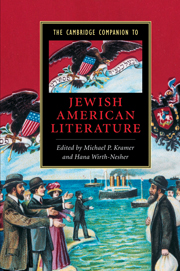Book contents
- Frontmatter
- Introduction: Jewish American literatures in the making
- 1 Beginnings and ends: the origins of Jewish American literary history
- 2 Imagining Judaism in America
- 3 Of crucibles and grandfathers: the East European immigrants
- 4 Coney Island, USA: America in the Yiddish literary imagination
- 5 Hebrew literature in America
- 6 Traces of the past: multilingual Jewish American writing
- 7 Accents of the future: Jewish American popular culture
- 8 Jewish American poetry
- 9 Jewish American writers on the Left
- 10 Jewish American renaissance
- 11 The Holocaust in the Jewish American literary imagination
- 12 Jewish American women writers and the race question
- 13 On contemporary literary theory and Jewish American poetics
- 14 Identity matters: contemporary Jewish American writing
- Index
- Series List
8 - Jewish American poetry
Published online by Cambridge University Press: 28 May 2006
- Frontmatter
- Introduction: Jewish American literatures in the making
- 1 Beginnings and ends: the origins of Jewish American literary history
- 2 Imagining Judaism in America
- 3 Of crucibles and grandfathers: the East European immigrants
- 4 Coney Island, USA: America in the Yiddish literary imagination
- 5 Hebrew literature in America
- 6 Traces of the past: multilingual Jewish American writing
- 7 Accents of the future: Jewish American popular culture
- 8 Jewish American poetry
- 9 Jewish American writers on the Left
- 10 Jewish American renaissance
- 11 The Holocaust in the Jewish American literary imagination
- 12 Jewish American women writers and the race question
- 13 On contemporary literary theory and Jewish American poetics
- 14 Identity matters: contemporary Jewish American writing
- Index
- Series List
Summary
Introduction
Up until quite recently, when the question of Jewish American poetic practice was raised, it was largely in the interest of declaring the enterprise difficult, if not impossible. Twenty-five years ago, Harold Bloom broached the subject in a now-infamous essay entitled “The Sorrows of American-Jewish Poetry.” As the funereal title suggests, Bloom takes a gloomy view of his subject, maintaining that, as a category of analysis, Jewish American poetry has all but withered on the vine before it has even blossomed. Indeed, he argues that the poetic process - which according to Bloom entails an agon, a wrestling, between a would-be poet and his precursor – is fundamentally alien to a Jewish sensibility on at least two counts. To begin with, even the most secularized Jew cannot wholly commit himself to the “pragmatic religion-of-poetry” (251) or to holda precursor poet in “god-like” esteem (253). The objection is predicated on an essentializing link between Christianity and the poetic, basedupon a mutual investment in the “universal” which necessarily precludes Jewishness, a category of being which Bloom sees as bound up with historicity and specificity. Furthermore, Bloom provocatively suggests that a poetic alliance between a Jewish poet anda “Gentile precursor” (such as Milton), a Jewish self mixing with a foreign other, is in some way transgressive –- a violation perhaps of a culture deeply committed to keeping its borders intact.
- Type
- Chapter
- Information
- The Cambridge Companion to Jewish American Literature , pp. 149 - 169Publisher: Cambridge University PressPrint publication year: 2003



